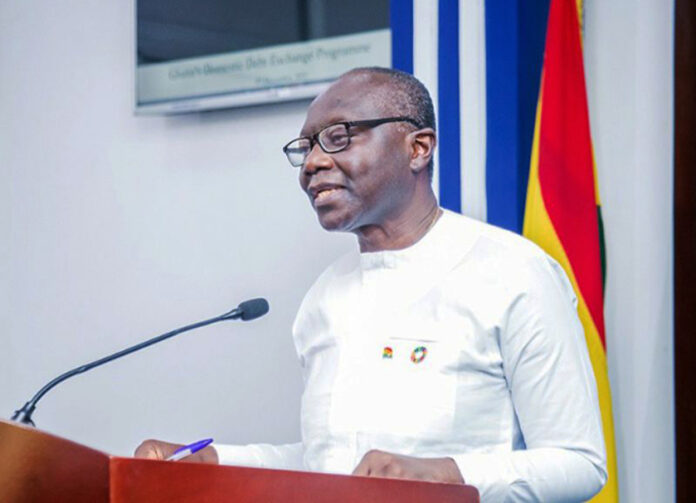Ken Ofori-Atta, the Minister for Finance, has prayed the multilateral donors and the global financial architecture to provide the required support to Climate Vulnerable countries to achieve the climate prosperity plans.
The Minister, who is the Chair of the VulnerableTwenty (V20) group of Finance Ministers, said a prompt and fast-paced support was necessary, in the face of mounting global crisis that has deepened the financial gap between the Vulnerable and Developed countries.
In a speech read on his behalf at one of the side meetings of the ongoing Conference of Parties (COP 28) in Dubai, on the topic: Action for Climate Targets (ACT) for a Net-Zero Future, he disclosed that 40 of the 68 Member States of the V20 Group were in debt distress.
“The climate prosperity actions developed by most of the 68 members were constrained by inadequate financing, high cost of capital and the squeeze in fiscal space especially after the Covid crisis,’’ he told his audience and added that this has led Vulnerable countries in their full swing of development, to build in further vulnerabilities with each investment rather than becoming more resilient”.
The Minister noted that, the time is ripe for the Multilateral Development Banks (MDBs) to incorporate climate vulnerability into their resource allocation metrics and ensure that climate vulnerable economies had access to low cost and concessional resources.
He also advocated for the MDBs to scale up credit enhancement tools and guarantees for Vulnerable countries and dedicate resources directly to project preparation facilities rooted in member country’s climate prosperity plan.
“By the World Bank and IMF Spring Meetings in 2024, MDB management should formulate plans for a general capital increase, articulating how the increase in capital will support development-positive climate action,’’ he insisted.
In 2022, US$60.9 billion of MDB climate finance was provided for low-income and middle-income economies. US$38.2 billion, equivalent to 63 percent, of this total was for climate change mitigation finance and US$22.7 billion or 37 percent for climate change adaptation finance. The amount of mobilised private finance stood at US$15.4billion.
The Minister while admitting the commendable support of the MDBs to low-income countries called for a swift process in releasing finance support to these countries as time remain of a real essence in the fight against climate change.
The Climate Prosperity Plain are national investment strategies that seek to maximize socio-economic outcomes for countries on the frontline of the climate emergency, through the deployment of maximised domestic renewable energy potential and climate-proofing of the economy.
The development of Climate Prosperity Plan, the Minister noted, is essential to foster climate prosperity through a deliberate climate action which included the adopted Accra-to-Marrakech agenda in October 2023 which outlined a number of salient points.
Other Speakers at the event included; Saroj Kumar, Global Director for the World Bank Group’s Water Global Practice, Pablo Viera, Global Director of the NDC Partnership Support Unit, Jorge Moreira da Silva, Under-Secretary-General and UNOPS Executive Director, Lilian Macharia, Director of Portfolio Management at Green Climate Fund and Emilie Potvin, Director of Partnerships, UNOPS.
President Akufo-Addo
Meanwhile, President Akuffo-Addo, addressing the same forum, stressed the critical need for a comprehensive reassessment of the international financial architecture to expedite and align it with climate action.
He underscored the urgent need to revamp financial system that not only increases resources, but also tailors them to meet the specific needs of communities most affected by climate change.
“The disproportionate level of emissions by industrialized nations has led to immense losses, approximately US$ 535 billion or 20 percent of wealth for Vulnerable Twenty (V20) economies over the last two decades,” President Akuffo-Addo highlighted, pointing out the imperative for advanced nations to honor their moral obligation in mobilizing additional resources to combat climate change, as outlined in the Paris Agreement.
“The CVF, since its inception in 2009, has stood as a testament to unity and shared purpose. The V20 Finance Ministers have played a crucial role in translating our political ambition into strategic economic roadmaps,” emphasised President Akuffo-Addo.
He further stressed the significance of initiatives like the Accra-Marrakesh Agenda and Bridgetown Initiative, which advocate for a more equitable and effective global financial system in the context of the climate crisis.
In a commendation of incoming leadership, President Akuffo-Addo expressed support for the incoming chair of the CVF, Prime Minister Mia Mottley of Barbados, and the new Secretary-General of the Forum, Mohammed Nasheed, reaffirming Ghana’s readiness to collaborate with their administrations.
Prime Minister Mia Mottley, the incoming Chair of the CVF, echoed the call for immediate action, emphasizing the urgency of addressing the challenges posed by climate change and the necessity for long-term financial commitments. She emphasized unity and collaboration, quoting a Barbadian proverb: “Let’s share the burden and the bounty together,” rallying all stakeholders to contribute to the cause.
Mohammed Nasheed, the newly appointed Secretary-General of the Climate Vulnerable Forum, highlighted the necessity of collective action, stressing that all nations are vulnerable in the face of climate change. Nasheed thanked the President of Ghana for elevating the CVF-V20 to an intergovernmental organisation.
Additionally, Prof Njuguna Ndung’u, Kenya’s Finance Minister, emphasised the significant diversion of resources caused by climate change, citing examples from Kenya and calling for market development in renewable energy and investments in water resource management as pivotal strategies to address these challenges.
The collective sentiment expressed by world leaders at COP 28 underscores a resolute call for immediate, collaborative action and structural reforms in international financial systems to effectively combat the escalating climate crisis.









